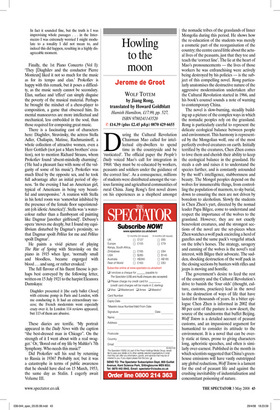Howling to the moon
Jerome de Groot
WOLF TOTEM by Jiang Rong, translated by Howard Goldblatt Hamish Hamilton, £17.99, pp. 527, ISBN 9780241143520 ✆ £14.39 (plus £2.45 p&p) 0870 429 6655 During the Cultural Revolution Chairman Mao called for intellectual city-dwellers to spend time in the countryside and be ‘rusticated’. The official paper the People’s Daily voiced Mao’s call for integration in 1968: ‘they must be re-educated by workers, peasants and soldiers under the guidance of the correct line’. As a consequence, millions of students were distributed amongst the various farming and agricultural communities of rural China. Jiang Rong’s first novel draws on his experiences as a shepherd amongst the nomadic tribes of the grasslands of Inner Mongolia during this period. He shows how the re-education of the students was merely a cosmetic part of the reorganisation of the country; the centre cared little about the actual lives of the peasants, just that they toe and teach the ‘correct line’. The lie at the heart of Mao’s pronouncements — the lives of those workers he was enfranchising were actively being destroyed by his policies — is the subject of this compelling novel. Rong particularly anatomises the destructive nature of the aggressive modernisation undertaken after the Cultural Revolution started in 1966, and his book’s counsel sounds a note of warning to contemporary China.
The novel is slow-burning, steadily building up a picture of the complex ways in which the nomadic peoples rely on the grassland. Rong is particularly careful to represent the delicate ecological balance between people and environment. This harmony is represented by the Mongolian wolf, one of the most perfectly evolved creatures on earth. Initially terrified by the creatures, Chen Zhen comes to love them and cherish their ability to keep the ecological balance in the grassland. He steals a cub and raises it to understand the species further, and is constantly astounded by the wolf’s intelligence, stubbornness and beauty. The Mongol peoples depend on the wolves for innumerable things, from control
1 P
ling the population of marmots, to sky burial, down to ensuring the men are not driven by boredom to alcoholism. Slowly the students in Chen Zhen’s yurt, directed by the nomad leader Papa Bilgee, come to understand and respect the importance of the wolves to the grassland. However, they are not exactly benevolent creatures, and the strongest sections of the novel are the set-pieces when Zhen watches a wolf pack encircling a herd of gazelles and the same pack’s vengeful attack on the tribe’s horses. The strategy, savagery and cunning of the wolves is the novel’s real interest, with Bilgee their advocate. The sudden, shocking destruction of the wolf pack in the closing sections by hunters with rifles and jeeps is moving and horrific.
The government’s desire to feed the rest of the country and the Cultural Revolution’s drive to banish the ‘four olds’ (thought, culture, customs, practices) lead in the novel to the destruction of ways of life that have lasted for thousands of years. In a bitter epilogue Chen Zhen is informed in 2002 that 80 per cent of the pasture is now desert, the source of the sandstorms that buffet Beijing. Wolf Totem is a detailed account of peasant customs, and an impassioned argument for humankind to consider its attitude to the environment. It is a novel that can be overly static at times, prone to giving characters long, aphoristic speeches, and often is similarly over-earnest. Published in the month in which scientists suggested that China’s greenhouse emissions will have vastly outstripped any global reductions, Wolf Totem is a lament for the end of peasant life and against the crushing inevitability of industrialisation and concomitant poisoning of nature.


















































































 Previous page
Previous page